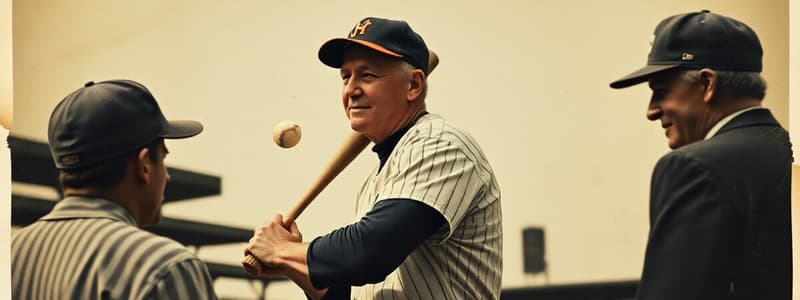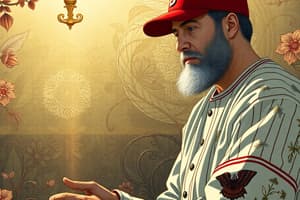Podcast
Questions and Answers
What feeling did the narrator experience after winning by cheating?
What feeling did the narrator experience after winning by cheating?
- Pride in their skills
- Satisfaction from bending the rules
- A sense of emptiness (correct)
- Joy from defeating their opponent
How did the narrator's parents influence their view on rules?
How did the narrator's parents influence their view on rules?
- Through consistent reminders and inspections (correct)
- By allowing short cuts during chores
- By encouraging exceptions to the rules
- By discussing the importance of flexibility
What phrase did the narrator's father often use to emphasize doing things correctly?
What phrase did the narrator's father often use to emphasize doing things correctly?
- If it's worth doing, it's worth doing right. (correct)
- If you want it done, do it yourself.
- Winning isn't everything.
- Rules are meant to be broken.
What behavior did the narrator exhibit when playing canasta against their grandmother?
What behavior did the narrator exhibit when playing canasta against their grandmother?
What was the result of Cal Sr.'s approach to rules for the narrator and their siblings?
What was the result of Cal Sr.'s approach to rules for the narrator and their siblings?
What was the initial amount of the gift given to help build a youth field?
What was the initial amount of the gift given to help build a youth field?
Which complex was the first Ripken complex built beyond Aberdeen?
Which complex was the first Ripken complex built beyond Aberdeen?
What is a key belief regarding trades expressed in the content?
What is a key belief regarding trades expressed in the content?
Which player was traded in the controversial 2002 trade involving the Cleveland Indians?
Which player was traded in the controversial 2002 trade involving the Cleveland Indians?
What lesson did the author learn about making trades in baseball?
What lesson did the author learn about making trades in baseball?
What was one reason the Indians won the American League pennant in 2016?
What was one reason the Indians won the American League pennant in 2016?
Which substance was used by pitchers to create a slippery ball to enhance their pitching?
Which substance was used by pitchers to create a slippery ball to enhance their pitching?
What did the myth-busting television show reveal about corked bats?
What did the myth-busting television show reveal about corked bats?
What is one technique mentioned that pitchers used to cut the ball?
What is one technique mentioned that pitchers used to cut the ball?
Why was Gaylord Perry's use of Vaseline criticized?
Why was Gaylord Perry's use of Vaseline criticized?
What does playing fair fundamentally involve according to the author's values?
What does playing fair fundamentally involve according to the author's values?
How does the author view the hidden-ball trick in baseball?
How does the author view the hidden-ball trick in baseball?
What does the author believe about stealing signs in baseball?
What does the author believe about stealing signs in baseball?
What lesson does the author highlight from his experience with Aryeh Bourkoff?
What lesson does the author highlight from his experience with Aryeh Bourkoff?
According to the author's philosophy, playing fair leads to what kind of victories?
According to the author's philosophy, playing fair leads to what kind of victories?
Flashcards are hidden until you start studying
Study Notes
Cal Ripken Jr.'s Perspective on Fairness
- Early Influence: Cal Ripken Jr.'s father instilled in him a strong sense of fair play, emphasizing that the right way is the only way.
- Fair Play Beyond Winning: Ripken believes in fair play not only for the sake of setting a good example, but also for the personal satisfaction of knowing one's victory was earned fairly.
- The Hidden-Ball Trick: Ripken considers the hidden-ball trick, which is legal by Major League Baseball rules, as unfair and not in the spirit of the game.
- Stealing Signs: Ripken believes in a fair match between batter and pitcher, considering stealing signs to give the batter an unfair advantage.
- Business Deals Based on Fairness: Ripken's business philosophy centers around mutually beneficial agreements, a win-win scenario for all parties involved.
- Baseball Trades: Ripken prefers trades that benefit both teams rather than seeking to exploit or outsmart the opposing team.
- Everybody Cheats? Ripken acknowledges that minor infractions are common, but emphasizes that everyone is responsible for drawing their own line between acceptable and unacceptable behavior based on personal values.
- Corked Bats: The use of corked bats, initially believed to enhance performance, was debunked by the TV show "MythBusters".
- Pine Tar and Spitballs: While pine tar was used to improve grip on the bat, the legality of its use on the bat's barrel remains unclear. Spitballs, a long-standing practice, were once tolerated but are now strictly prohibited.
- Cutting the Ball: Pitchers have resorted to using sharp objects to alter the ball's flight path, resulting in incidents of suspension and fines due to the unfair advantage gained.
Fairness in Life and Business
- Beyond Baseball: Ripken believes that fairness in all aspects of life builds trust, respect, and positive outcomes.
- The Ripken Experience: Ripken's business model, The Ripken Experience, which includes baseball complexes aimed at youth development, is built on the ideals of fair play and the right way of doing things.
- The Oriole Way: The Oriole way, characterized by fair play and mutual benefit, has influenced both Ripken's personal and professional values.
- The "Win-Win" Trade: Ripken believes in trades that are mutually beneficial to both teams, leading to stronger rivalries and future opportunities.
The Importance of Fairness in Sports
- The author explores fairness in sports by contrasting the concepts of legal and fair.
- Legal actions are outlined by rules, both in sports and society, such as not driving on a one-way street or drinking underage.
- Fairness, however, is a more subjective concept, often blurring with the idea of legal.
- In sports, the author presents the example of Alabama's potential strategic foul during the 2017 College Football National Championship game, where they could have intentionally broken the rules to maintain a chance of winning. This scenario highlights the grey area between the legality of actions and their perceived fairness.
The Role of Mental Games
- The author argues that intentional attempts to "get into another person's head," such as using psychological tactics to unnerve opponents, are not covered by rule books but are still a prevalent part of sports, exemplified by the stories of Donald Trump and Michael Jordan.
- The author highlights that psychological manipulation can have unintended consequences, as seen in his own experience where a simple compliment led to a slump in his performance.
- The author emphasizes his personal preference: he wants to win through legitimate skill and effort, not by manipulating opponents psychologically.
- The author further explores the ethical concerns of mental games, citing the example of his son Ryan facing pressure and negativity due to his last name and performance expectations.
The Practice of Intimidation
- The author discusses the common practice of "headhunting" in baseball, where pitchers intentionally throw at batters to intimidate them.
- This tactic serves a strategic purpose: to disrupt the hitter's rhythm and confidence.
- The author lists several players known for this practice and explores the rationale behind it, suggesting it stems from a deep-rooted, albeit unfair, element of the game.
Subjectivity and Technology's Influence
- The author acknowledges the existence of ambiguous scenarios in sports, where the line between fair play and unfair tactics can be blurry.
- He shares his personal experience of faking a foul ball to get calls in his favor, recognizing this as ethically gray.
- The author highlights the impact of technology on both enforcing fairness and facilitating unfair practices.
- He cites the Boston Red Sox's use of an Apple Watch to decode and relay signs, demonstrating how technology can be misused for gaining an unfair edge.
Personal Values and Fair Play
- The author concludes that determining what is fair is a deeply personal process, influenced by one's values and beliefs.
- He emphasizes the importance of consistent ethical standards, even outside the watchful eye of rules and officials.
- The author reflects on his childhood values, guided by his parents, and how they continue to shape his understanding of fairness.
- He uses the anecdote of his father's station wagon to illustrate his dedication to "doing the right thing" even when no one is observing.
- He suggests this intrinsic sense of responsibility is paramount in defining one's personal standard of fair play and should guide individuals in ethical decision-making.
Studying That Suits You
Use AI to generate personalized quizzes and flashcards to suit your learning preferences.





